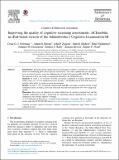Files in this item
Improving the quality of cognitive screening assessments : ACEmobile, an iPad-based version of the Addenbrooke's Cognitive Examination-III
Item metadata
| dc.contributor.author | Newman, Craig G. J. | |
| dc.contributor.author | Bevins, Adam D. | |
| dc.contributor.author | Zajicek, John P. | |
| dc.contributor.author | Hodges, John R. | |
| dc.contributor.author | Vuillermoz, Emil | |
| dc.contributor.author | Dickenson, Jennifer M. | |
| dc.contributor.author | Kelly, Denise S. | |
| dc.contributor.author | Brown, Simona | |
| dc.contributor.author | Noad, Rupert F. | |
| dc.date.accessioned | 2018-02-20T12:30:05Z | |
| dc.date.available | 2018-02-20T12:30:05Z | |
| dc.date.issued | 2018 | |
| dc.identifier | 251876410 | |
| dc.identifier | 7f14ad3b-4967-4a9d-8895-0f736ce49c97 | |
| dc.identifier | 85042103770 | |
| dc.identifier.citation | Newman , C G J , Bevins , A D , Zajicek , J P , Hodges , J R , Vuillermoz , E , Dickenson , J M , Kelly , D S , Brown , S & Noad , R F 2018 , ' Improving the quality of cognitive screening assessments : ACEmobile, an iPad-based version of the Addenbrooke's Cognitive Examination-III ' , Alzheimer's & Dementia: Diagnosis, Assessment & Disease Monitoring , vol. 10 , pp. 182-187 . https://doi.org/10.1016/j.dadm.2017.12.003 | en |
| dc.identifier.issn | 2352-8729 | |
| dc.identifier.other | RIS: urn:AADD78DAEE17D25FFEC5C37917B25CF6 | |
| dc.identifier.other | ORCID: /0000-0003-3481-825X/work/64034674 | |
| dc.identifier.uri | https://hdl.handle.net/10023/12759 | |
| dc.description | The authors would like to acknowledge the National Institute for Health Research Collaboration for Leadership in Applied Health Research and Care in the South West Peninsula (PenCLAHRC) and Clinical Trials Methods in Neurodegenerative Diseases (Programme Grant RP-PG-0707-10124). | en |
| dc.description.abstract | Introduction: Ensuring reliable administration and reporting of cognitive screening tests are fundamental in establishing good clinical practice and research. This study captured the rate and type of errors in clinical practice, using the Addenbrooke's Cognitive Examination-III (ACE-III), and then the reduction in error rate using a computerized alternative, the ACEmobile app. Methods: In study 1, we evaluated ACE-III assessments completed in National Health Service (NHS) clinics (n = 87) for administrator error. In study 2, ACEmobile and ACE-III were then evaluated for their ability to capture accurate measurement. Results: In study 1, 78% of clinically administered ACE-IIIs were either scored incorrectly or had arithmetical errors. In study 2, error rates seen in the ACE-III were reduced by 85%–93% using ACEmobile. Discussion: Error rates are ubiquitous in routine clinical use of cognitive screening tests and the ACE-III. ACEmobile provides a framework for supporting reduced administration, scoring, and arithmetical error during cognitive screening. | |
| dc.format.extent | 6 | |
| dc.format.extent | 288115 | |
| dc.language.iso | eng | |
| dc.relation.ispartof | Alzheimer's & Dementia: Diagnosis, Assessment & Disease Monitoring | en |
| dc.rights | © 2017 Published by Elsevier Inc. on behalf of the Alzheimer’s Association. This is an open access article under the CC BY-NC-ND license (http://creativecommons.org/licenses/by-nc-nd/4.0/). | en |
| dc.subject | Screening assessment | en |
| dc.subject | Cognitive assessment | en |
| dc.subject | Alzheimer's | en |
| dc.subject | Dementia | en |
| dc.subject | Computerized | en |
| dc.subject | App | en |
| dc.subject | Usability | en |
| dc.subject | Validity | en |
| dc.subject | Administrator error | en |
| dc.subject | RC0321 Neuroscience. Biological psychiatry. Neuropsychiatry | en |
| dc.subject | QA76 Computer software | en |
| dc.subject | NDAS | en |
| dc.subject.lcc | RC0321 | en |
| dc.subject.lcc | QA76 | en |
| dc.title | Improving the quality of cognitive screening assessments : ACEmobile, an iPad-based version of the Addenbrooke's Cognitive Examination-III | en |
| dc.type | Journal article | en |
| dc.contributor.institution | University of St Andrews.School of Medicine | en |
| dc.contributor.institution | University of St Andrews.Cellular Medicine Division | en |
| dc.identifier.doi | 10.1016/j.dadm.2017.12.003 | |
| dc.description.status | Peer reviewed | en |
This item appears in the following Collection(s)
Items in the St Andrews Research Repository are protected by copyright, with all rights reserved, unless otherwise indicated.

